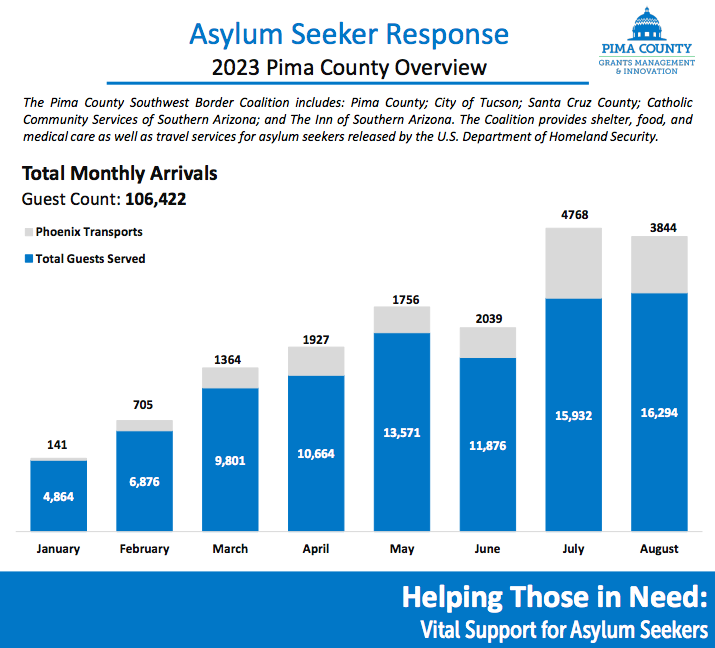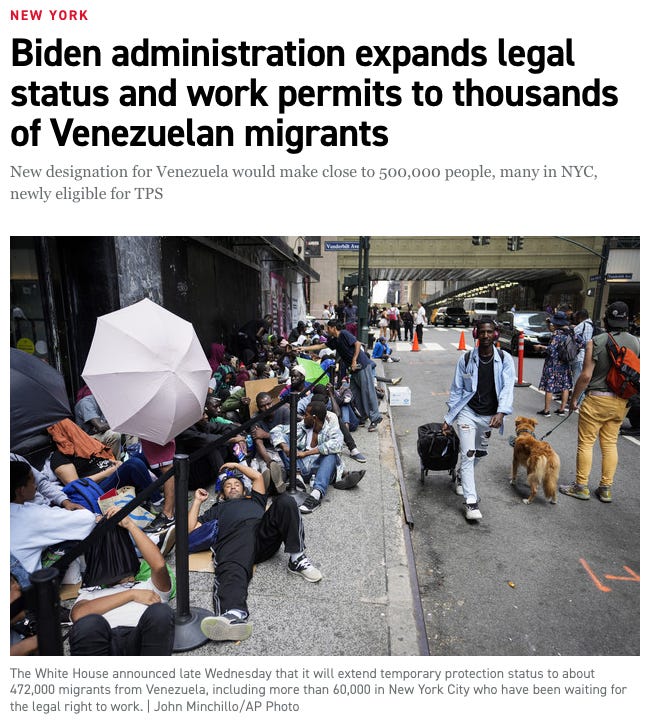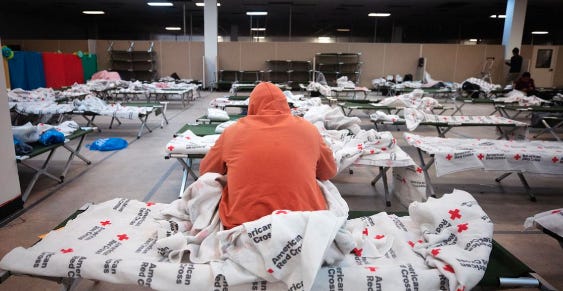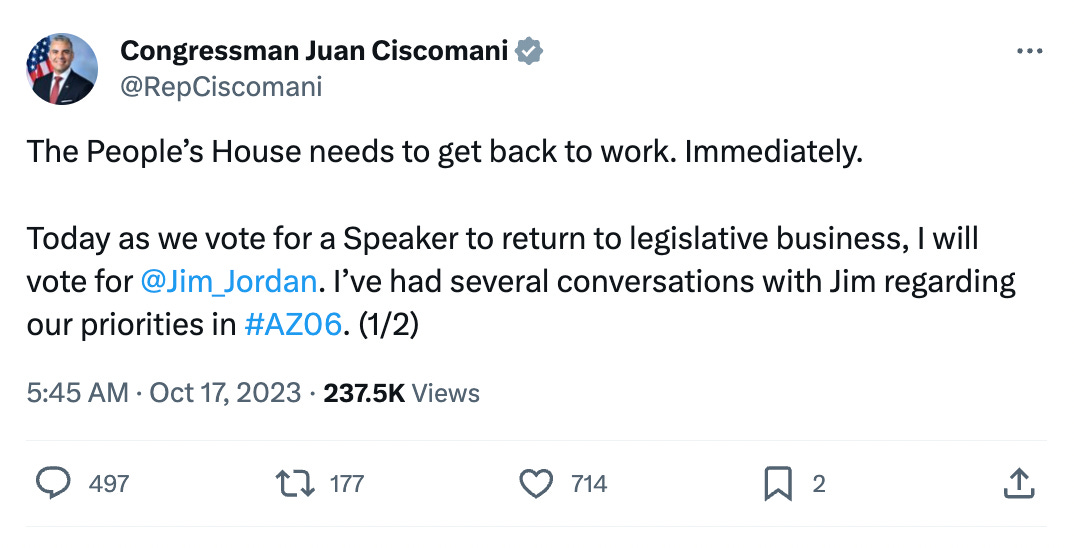The Daily Agenda: Small steps in the Big Apple
Fiscal cliff for Pima County asylum program … Venezuelans in NYC get work permits … Ciscomani supports Jordan.
Well, that fizzled pretty quickly.
When the Biden administration announced in late September that Venezuelan asylum seekers could get work permits, it was supposed to be a breakthrough that would ease the taxpayer burden in New York, where thousands of Venezuelans were sleeping in city-run shelters.
That, in turn, would have given some breathing room for Pima County officials who oversee the program that takes care of asylum seekers for a few days after they cross the border in Southern Arizona.
Instead, the work permit program in New York ran right into the quagmire of federal bureaucracy.
The Pima County program is funded by the federal government and it is on pace to run out of those funds by spring. If it does, county officials will have to make hard choices about the future of a program that has helped out 264,000 asylum seekers since the start of 2019.
The clock is ticking a little faster than it was earlier this year. Pima County’s program now costs about $2.7 million in federal funds every month, up from about $1.8 million earlier this year, due to a rise in people crossing the border this summer.
The situation in New York isn’t helping matters. Over the summer, New York officials pulled $104 million from the same pot of money that funds Pima County and other border jurisdictions that care for asylum seekers. (We wrote about it early last month and we’re keeping track of the story as Pima County’s “fiscal cliff” looms)
Help us keep track of more stories with a paid subscription!
Unfortunately, the work permit program in New York, announced with such fanfare, is struggling to get off the ground.
First off, only about 9,500 Venezuelan asylum seekers of working age in New York shelters are eligible for the work permits. That’s a small portion of the roughly 60,000 in New York.
Why so few? The Biden administration said Venezuelans had to have been in the U.S. before July 31 to be eligible for work permits. The point of the cutoff date was to discourage any more Venezuelans from heading to New York, but it might have stripped away most of the value of the program itself.
The application cost for the work permits also is causing problems. The work permits are supposed to help people who can’t afford to live anywhere but a city-run shelter. But the application for the permits costs $545. That’s not exactly pocket change.
The federal government offers a waiver to get out of paying those application fees, but people can’t apply for it online. They have to do it via snail mail.
Even if asylum seekers get approved, they still have a mountain of paperwork to deal with before they can actually get a job. It’s so much that New York Gov. Kathy Hochul deployed 150 National Guard troops to help asylum seekers fill out the forms.
Hochul and New York Mayor Eric Adams also announced $30 million for legal services and $8 million for case management. Just that amount would be enough to fund the efforts in Pima County for about a year.
Even if the bureaucracy runs at its normal pace, many Venezuelan asylum seekers won’t be able to legally work for three to nine months.
It’s looking like Adams was spot on when he cautioned, shortly after Biden officials announced the work permit program, “We don’t want to prematurely spike the ball.”
In the meantime, the Pima County program at the Casa Alitas Welcome Center is still humming along, but they could use help with donations of lotion, sunscreen, hygiene products, clothes, belts, kids’ toys, among other items.
Records request: The Pima County Attorney’s Office doesn’t want to release grand jury transcripts in the case of Tucson police officer Ryan Remington, who fatally shot a man in a wheelchair during a shoplifting incident in 2021, the Tucson Sentinel’s Paul Ingram reports. Those records are normally kept secret under Arizona law and county prosecutors said there is no reason to bypass that in this case, but Remington’s lawyers say they need them. A judge said defense lawyers can see the documents, but can’t make them public. The county attorney’s office has asked that nobody get the records until it appeals the decision.
Crisis management: The Humane Society of Southern Arizona has appointed Beth Morrison as Interim CEO for the next six months, KGUN’s Bri Pacelli reports. The announcement comes in the wake of a months-long scandal involving the transfer of hundreds of small animals to a reported reptile farm, which led to two of the organization’s leaders leaving their posts. HSSA says it chose Morrison based on her track record of successfully guiding organizations through challenging situations.
Recreation over residences: The Oro Valley Town Council is voting today on a long-discussed code amendment that would require more private recreation space in new single-family and townhome developments, Tucson Local Media’s Dave Perry writes. The new rules would also double the required shade structure for playgrounds, sitting areas and other amenities in private parks. The Southern Arizona Home Builders Association is asking the town council to take into consideration the impact on housing affordability, saying that more recreation space within subdivisions means less space for homes “in a housing market where inventory is desperately needed.”
That didn’t age well: Arizona U.S. Rep. Juan Ciscomani joined Arizona’s Republican congressional delegation in supporting “America First” Republican Jim Jordan for speaker of the U.S. House. Jordan lost his first bid after receiving only 200 votes, short of the 217 needed, because 20 Republicans voted against him. The search for the next speaker continues.
Not-so-open meetings: Residents are calling for transparency by the Santa Cruz County Board of Supervisors and Nogales City Council, after back-to-back executive sessions under questionable circumstances, the Nogales International’s Angela Gervasi reports. Arizona’s open meeting laws require that quorums of governmental boards and commissions meet in public, with the exception of executive sessions, which are usually reserved for legal advice. Both groups held executive sessions during meetings this month regarding a controversial Rio Rico mining project and the employment agreement for Nogales’ new city manager.
Homing in on healthy habits: University of Arizona Campus Health is holding weekly workshops to teach students healthy coping skills to deal with the stress of college life, El Inde Arizona’s Lindsey Ray Johnson writes. Wednesday Wellness Workshops focus on improving mental health and giving students resources and skills to help them take charge of their well being. Topics include sleep and stress, boundaries and self-care, smart drinking and healthy phone habits.
“All the things that we create are from student need and from things we hear from students,” said health educator Ryley Tegler. “We are really looking at the student data and tailoring it to what (they) need and really letting students know that this is stuff that students have identified.”
18,000: The number of asylum seekers in Chicago. Just like New York, officials in Chicago are trying to figure out how to balance their welcoming values with the fiscal costs of providing shelter.












Thanks for letting us know how Ciscomani voted..it was hard to find out, especially from his site.